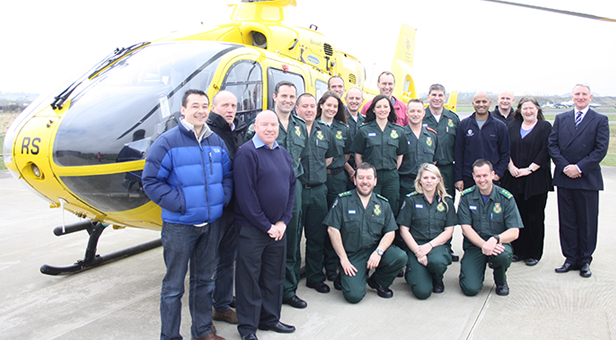
Paramedics take a quick break during their first day of education and training. Paramedics pictured in Green: Mark Williams, Steve Freeman, Michelle Walker, Mark Penwarden, Leonnie German, Adam Watts, Paul Owen, Mike Rowland, Claire Baker and, Simon Trenchard Doctors pictured: Ian Mew, Tony Doyle and Rob Torok (Instensive Care – Dorset County Hospital), Jeremy Reid (Intensive Care- Yeovil District Hospital), Phil Hyde (Paediatric Intensive Care – Southampton General Hospital) and Dr Farhad Islam, (Emergency Medicine – Royal Bournemouth Hospital). Also pictured: Professor Julia Williams and John Donaghy from the University of Hertfordshire and Bill Sivewright, Dorset and Somerset Air Ambulance Chief Executive Officer)
Paramedics employed by South Western Ambulance Service NHS Foundation Trust (SWASFT) and seconded to the Air Ambulance have taken their first steps towards obtaining a Masters Degree in Advanced Paramedic Practice (Critical Care).
The programme started on 25 February and is sponsored by Dorset and Somerset Air Ambulance. It’s being delivered in partnership with the University of Hertfordshire, SWASFT and Doctors and Consultants from Royal Bournemouth Hospital, Dorset County Hospital, Musgrove Park Hospital, Salisbury District Hospital, Southampton General Hospital and Yeovil District Hospital.
Armed with this qualification, these paramedics will be well placed to assume any future role as critical care paramedics working independently or as part of critical care teams alongside specialist doctors.
The day began with an introduction from Bill Sivewright, Dorset and Somerset Air Ambulance Chief Executive Officer. Bill said, “Today sees the beginning of something special and unique. Our aspiration has always been to set up an extended paramedic training programme which will improve paramedic skills that can deliver real benefit to the patient.
“The unique element to the University of Hertfordshire’s MSc Advanced Paramedic Practice (Critical Care) programme is the fact that all the education and training will take place locally by academics and visiting lecturers consisting of doctors and consultants from across the region, who will provide teaching and mentoring both on land and in the air.
“This means that patients in Dorset and Somerset will benefit from the application of advanced skills very early in the process. I would like to thank Dr Farhad Islam (Consultant in Emergency Medicine, Royal Bournemouth Hospital and the Training Department of SWASFT for their hard work in developing the syllabus in conjunction with the University of Hertfordshire and in helping to draw together the faculty of leading Doctors and Consultants.”
Dr Farhad Islam commented, “This mixture of Emergency Physicians, Intensive Care Consultants, Anaesthetists and Critical Care Nurses have been selected because they are fantastic at what they do both in their roles in hospital and as teachers. Throughout this process, the paramedics will enhance their patient assessment skills, gain a wider knowledge of drugs, improve their diagnostic abilities, advance their management of pain and become better at clinical decision making.”
The establishment of Critical Care Paramedics is potentially an important development in improving quality and reducing mortality rates in the most seriously ill and injured patients. Effective resource management involves co-ordinating and deploying the most experienced and skilled paramedics to treat and transfer the most high-risk patients to the best-equipped hospitals or trauma centres in the region. This principle holds true for an increasing range of critical patient presentations such as heart attack, stroke, major trauma and paediatric critical illness.






